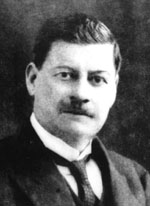Charles Eliot (diplomat)
|
The Right Honourable Sir Charles Eliot GCMG CB |
|
|---|---|
 |
|
| Vice-Chancellor of the University of Hong Kong | |
|
In office 1912–1918 |
|
| Succeeded by | Prof. G.P. Jordan |
| Vice-Chancellor of the University of Sheffield | |
|
In office 1905–1913 |
|
| Succeeded by | Herbert Fisher |
| Personal details | |
| Born |
8 January 1862 Sibford Gower, Oxfordshire |
| Died | 16 March 1931 (aged 69) Strait of Malacca |
| Spouse(s) | never married |
| Alma mater |
Cheltenham College Balliol College, Oxford |
Sir Charles Norton Edgecumbe Eliot GCMG CB PC (8 January 1862 – 16 March 1931) was a British diplomat, colonial administrator and botanist. He served as Commissioner of British East Africa in 1900–1904. He was British Ambassador to Japan in 1919–1925.
He was also known as a malacologist and marine biologist. He named the sea slug species Chelidonura varians Eliot, 1903.
Eliot was born in the village of Sibford Gower near Banbury, Oxfordshire, England and educated at Cheltenham College and Balliol College, Oxford, where he took a double first in classical moderations and Greats, as well as winning the Craven, Ireland and Hertford scholarships. Remarkably, he also won the Boden Sanskrit Scholarship and the Houghton Syriac prize. He was a noteworthy linguist, with a full knowledge of 16 languages and conversant in 20 more.
Eliot served in diplomatic posts in Russia (1885), Morocco (1892), Turkey (1893), and Washington, D.C. (1899). He also served as British Commissioner in Samoa. He was appointed a Companion of the Order of the Bath (CB) in the 1898 Birthday Honours and was knighted as a Knight Commander of the Order of St Michael and St George (KCMG) in the New Year honours list 1 January 1900.
In 1900, he was appointed commissioner of British East Africa, and on 1 January 1902 he was appointed Commissioner, Commander-in-Chief and Consul-General for the East Africa Protectorate, including the mainland dominions of the Sultan of Zanzibar, and also as British Agent and Consul-General for the island dominions of the Sultan.
...
Wikipedia
